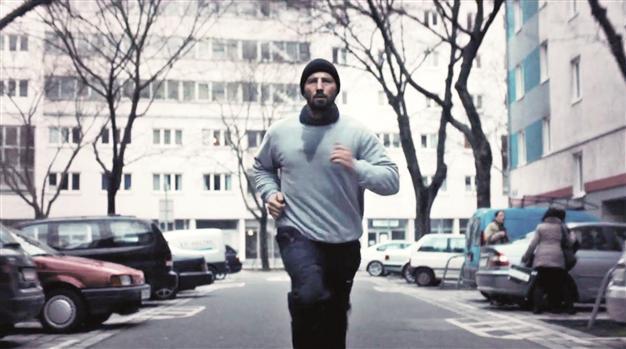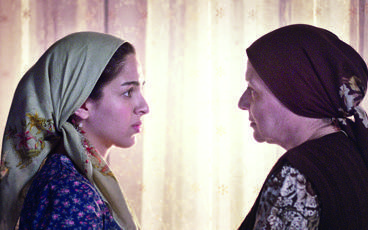‘Cracks in Concrete’ exposes cracks in family
EMRAH GÜLER ANKARA
 Newcomer Austrian-Turkish filmmaker Umut Dağ had wowed the audience and critics alike in 2012 when his debut feature “Kuma” (Second Wife) opened the Panorama section in 2012 Berlin International Film Festival. The film was nominated for an Audience Award and Best Debut Film in Berlin, and later garnered nine awards and as many nominations in the festival circuit.
Newcomer Austrian-Turkish filmmaker Umut Dağ had wowed the audience and critics alike in 2012 when his debut feature “Kuma” (Second Wife) opened the Panorama section in 2012 Berlin International Film Festival. The film was nominated for an Audience Award and Best Debut Film in Berlin, and later garnered nine awards and as many nominations in the festival circuit.“Kuma” takes a look at arranged marriages, culturally accepted polygamy, and the culture clash faced by Turks residing in Europe through the eyes of women, or more specifically, through the eyes of its 19-year-old, fresh-faced protagonist Ayşe, played to haunting effect by Begüm Akkaya. When Ayşe is taken from her village in rural Turkey to be shipped off to Vienna and married to a man a few years her senior, all seems well.
In reality, their marriage is a ruse where Ayşe is taken to be the second wife of her husband’s father. The old man’s wife, Fatma (Nihal Koldaş), is fighting cancer, and ready to welcome a successor to her marriage. “Kuma” is a layered, mature drama that tackles its sensitive subject matter with ease and sophistication reserved for seasoned directors. Following its original release in Austria and France, the film found a release date in Turkey a year later, in 2013.
 Thanks to Başka Sinema, the alternative cinema platform enabling independent films to find release dates and theaters in Turkey, Dağ’s sophomore feature, “Cracks in Concrete” (Risse im Beton), comes to theaters this week. “Cracks in Concrete” takes some familiar themes from “Kuma” and places them in a setting that is quite the opposite of what we saw in Dağ’s debut feature.
Thanks to Başka Sinema, the alternative cinema platform enabling independent films to find release dates and theaters in Turkey, Dağ’s sophomore feature, “Cracks in Concrete” (Risse im Beton), comes to theaters this week. “Cracks in Concrete” takes some familiar themes from “Kuma” and places them in a setting that is quite the opposite of what we saw in Dağ’s debut feature.“Kuma” dissected the defining features and the changing dynamics, exposing the cracks in the process, of family through the eyes of women. Dağ used confined and closed spaces for an added effect of claustrophobia. “Cracks in Concrete” takes the fall of the family as one of its central themes as well, further exposing the cracks and its dysfunction. Here, however, it’s the man’s world, the brutal and mean streets where tough men rule and fall. The claustrophobia is still intact, just in another guise.
Like father, like son
“Cracks in Concrete” follows two men from two generations who have made, and on the verge of making, some bad decisions. Murathan Muslu (seen both in “Kuma” and Dağ’s award-winning short, “Papa”) plays the reformed convict Ertan who has just come out of jail, having completed his decade-long sentence. The only thing that will keep him going is getting closer to his 15-year-old son Mikail (Alechan Tagaev) who doesn’t have any idea what his father looks like.
Ertan finds a construction job in a Vienna youth center going through a refurbishment where Mikail frequents, using the basement as a studio for his gangsta-rap demo recordings. In a life where not much is in his favor, Mikail’s dream is to make it big with his music. Until then, he has to make money and Mikail sells weed in a local club where he begins treading closer to danger as he begins selling heavier drugs. While “Cracks in Concrete,” at its heart, is Ertan’s story, it is mostly Mikail’s story that the plot revolves around. Moving fast toward trouble, Mikail, at the same time, forges a relationship with the affectionate construction worker in the youth center. Ertan is too grounded not to hope for a father-son relationship; his only hope is to become a father figure even if for a fleeting period of time. Deep down, he is aware that the occasional advice is the best he can hope for.
The first half of “Cracks in Concrete” gives the feeling of a lack of direction as the stories unfold, and then there is the occasional sense of the plot being predictable, leering toward familiar places. But soon it becomes evident that Dağ, and the writer Petra Ladinigg, have been aiming at something all too bigger – the development of a character in all of its layers and complications. Ertan becomes the tour-de-force of “Cracks in Concrete,” with Muslu breathing life into a memorable character on film.
















